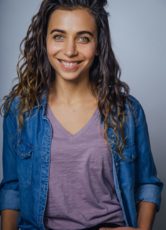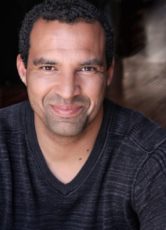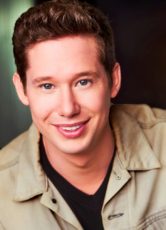
Siren actor Ian Verdun has made an impact in show business, and his life, in more ways than one. The interview below has real quality answers to a lot of burning questions that actors have.
Ian, a graduate of the California Institute of the Arts and the British American Drama Academy, talks with brutal honesty and gives us a great starting point on how to help diversify the entertainment field.
You play series regular Xander McClure on Freeform’s Siren. Originally, your character was written as a blonde, Thor-type look. How’d you hear about the audition? If casting was looking for a different look, how come you were sent on the audition? What did you wear? Were you given sides?
The credit really has to go to my agent, Matt Gogal. He’d apparently been tracking the role for a while and really thought I’d be great for it, physical descriptions be damned. It’s why it’s important to have reps that understand you as an artist and what you bring to the table that’s deeper than the superficial. After I read the script, I totally saw what he saw and didn’t concern myself too much with the descriptions, plus Freeform was integral to encouraging everyone to think outside of the box in those terms, so for that (and sooo much more) I’ll be forever grateful.
As for the initial audition, I had a pre-read with Tannis Vallely and Seth Caskey, and they were the sweetest, most supportive people over the course of the whole process. I remember being proud of what I did initially, but I’ve really learned to let auditions go. You have to learn to just move on because you can’t get too attached to a role before it’s yours, it’s just a recipe for heartbreak. I was also preoccupied with selling a show I had created at the time, so it was pretty easy for me to shift focus. But everything happened pretty quickly after that; I had a directors’ session with Emily Whitesell (our showrunner) and Scott Stewart, who directed the pilot and then it was on to the network test. I had my very first test experience the year before (Spoiler alert: I didn’t get it) and I was already familiar with the process so the whole thing felt a lot less scary; I was really able to just enjoy myself.
As for what I wore? I remember it was simple, he’s a fisherman so it’s not like I had to show up in a three piece suit or anything. I always try to dress to the essence of a character without being too literal. As far as sides, they definitely gave us some, they always do. I remember it was two scenes and I always bring the sides to the audition, even though I’m great at memorization. It’s just better to have the lines there, just in case. Trust me, that was a lesson hard-learned, lol.
What can be done to further the careers of people of color in the entertainment world?
Far smarter people than me have wrestled with this question for longer than I’ve been alive, but if you’re asking for my humble opinion, I really think the answer to representation in front of the camera is addressed by having more representation behind the camera. There have to be people in positions of power who see the value in diverse perspectives, and not just on a superficial or solely monetary level. And not just directors and producers (which is still vitally important) but also studio heads, financiers, and network executives. The lack of people of color in these positions is near ubiquitous, but when they are there, their presence sends ripples down the decision-making process in terms of staffing, casting and everything in between.
You’re a big, scary looking dude. What did your first headshot look like compared to today’s headshot?
Well, I don’t think I’m that scary, lol. I’m really a big, goofy teddy bear when you get to know me. I remember I got my first headshot when I was 16, and this was back in the days when black & white headshots were the industry standard. I had this huge, shit-eating grin and no sense of what kinds of characters I wanted to play. Suffice it to say I never got any auditions out of those shots, but I did use them for my college admissions a year later. I’ve been through so many headshots at this point in my career that it’s hard to say what worked and what didn’t. There are so many factors that go into getting legit auditions, I feel like the idea that one headshot is some kind of silver bullet is kind of wishful thinking. That said, I try to get shots that are representative of what I look like in that moment in my life. While my face still reads rather young, as I get older there’s a maturity that sets in behind your eyes and the camera totally picks all of that up. But I dropped the smile for my main shot ages ago, for me a more neutral expression works best. You want people to be able to imagine you in as many scenarios as possible.
Image is a big part of show business. How many tattoos do you have? Did your tattoos ever prevent or help you in getting a job?
I only have three tattoos currently, but I definitely plan on getting more. None of my tattoos have worked against me so far, but I’m very conscious about where I get them. I try to put them in places that are easy to cover, and get sizes that aren’t too tricky to cover with makeup. I think the industry has changed a lot in terms of accepting body art on actors, especially since tattoos have become less taboo in society in general. And right now I play a former fisherman, so my tattoos play into the character which is a luxury, really. I didn’t start getting any until I was in my late 20s and I’d get a full sleeve if I thought it was smart. The culture may be opening up in terms of tattoos, but as an actor it’s still important to be strategic about it. If you get too many that are too visible, you can definitely still run the risk of getting typecast. I mean…unless your Angelina Jolie.
What’s your workout and eating routine?
I’ve actually stepped up my workout routine recently! Since my character on Siren is growing and moving into being a cop on the show, I wanted to show that whole transformation physically as well. I started working out at home a little while ago and I love it; turns out it was pretty prophetic since all the gyms closed down from COVID-19 a few months later. I played football for years, and I’m naturally just a barrel-chested guy so it doesn’t take much for me to put on muscle. My issue is getting lean, so I have to do a lot of cardio…like a lot. Currently I’m working my way through Insanity Max 30, which is all high intensity interval training you can do in your living room. I usually end up crying in a pool of sweat every day, but the results speak for themselves. And I always try to eat healthy, which isn’t that hard for me but I do have a pretty demanding sweet-tooth, which is something I have to be vigilant about. Cheesecake is my best friend and worst enemy, we’re total frenemies.
Besides being an actor, you’re also a writer and producer. What projects of your own are you currently working on and how do you think they will make an impact on the world?
Currently I’m working on the feature film version of my project, “Life’s a Drag” which was originally envisioned as a series. If you wanna check it out just head over to YouTube and search “Life’s a Drag: The Series”, you’ll be glad you did. I’m also developing another show, a dark fantasy that I’ve been literally working on for the better part of 20 years, plus a football movie. As far as their potential impact? Like I said before, it’s all about representation and diverse perspectives in front of and behind the camera. I hope that these narratives will not only amplify and add to the wave of diverse, original content coming out now, but I also hope to do my part to make sure sure that diversity is continually normalized in all levels of the production pipeline. From people of color, to gender diversity, to LGBTQ representation; I want the next generation to be able to stand upon my shoulders just as I stand on the shoulders of countless pioneers that influenced me in my younger years and continue to inspire me to this day. The world is a big, beautiful place with so many different kinds of stories. I want to do my part to ensure that all those stories have a place in our cinematic culture.
Heard you don’t like spiders! What’s your worst spider story?
Ugh, spiders. One thing that some people know about me, bugs love to bite me. Ever since I was a little kid, if there was a room full of people or a sleepover, I would be the one person who would walk away with a gnarly bite; whether it was a mosquito or a spider. To make matters worse, I would always have an allergic reaction to the bite, so I learned to be very, very wary of insects. The sight of a spider won’t send me into a tailspin nowadays, but you can count on me keeping an eye on it if I see one indoors. These days I tend to do backflips to get out of the way of bees and wasps because they always come to me, I can’t tell you how much they literally stalk me during the spring. There’ve been a few ruined takes on Siren because some bee buzzed into my personal space and I jumped out of frame. There are outtakes to prove it, lol.
Has watching other actors in television and film helped you learn more about your craft? How so? Do you secretly want a second season of Little Fires Everywhere? How has Kerry Washington and Reese Witherspoon’s interaction affected you as an actor, writer and producer?
Of course it does! I love watching mastery at work; witnessing an actor peel back the layers of a character and let an audience into a vulnerable and honest moment. I live for things like that. I’m also a firm believer that you should always remain a student of your craft, a student in life actually. Any true master will tell you that they are constantly learning, constantly challenging themselves absorbing lessons from every corner of life. So in that regard, watching TV is basically homework for me, which is something I really wish I could tell my ten year old self, lol.
As for my desire for a second season? I really think that’s a story that’s okay being told in one season. It was so intense, so intricate and so well crafted, but part of the power of the story is allowing it to exist as a moment in time. There’s nothing wrong with a beginning, middle and an end. Though I would love to see what Reese and Kerry do next! They’re such a great example of what can be achieved by championing the stories you believe in and creating a space for new narratives to be explored. That’s definitely where I want to go with my career, so to see the two of them execute it all so magnificently is really inspiring.
You struggled in your early years, not having a lot of money growing up and well into your days when you moved to New York. Is there a certain mindset that you have to survive and succeed? Have you seen people in the same situation as you not having that drive to better themselves and their situations? What advice can you offer to someone who is in a rut and cannot see the light at the end of the tunnel?
Well, first I wanna say that I can only speak to myself and it’d be totally unfair of me to lay judgement at the feet of those who I may perceive as less driven than me. In my experience everyone wants a better life for themselves, we all want success and we’re all driven; but the question really is “what are you driven by?” You can’t get into this business for success’ sake, or for the money, or fame, or even for survival. Seriously, if you’re looking to be an artist as a means of survival (fiscally anyway) I really suggest you reconsider your priorities, lol. Everyone has their own set of obstacles and battles (both internal and external) so the road is just going to be different for everybody. For me it’s always been a question of, what am I willing to sacrifice for this dream? Since I grew up poor, the prospect of continuing to be poor until I figured out how I could make my dreams happen didn’t seem like a huge ask. I was so used to the daily stresses of poverty, I didn’t have much to lose by going after my goals, full throttle. I was also stubborn as hell and I honestly didn’t care how much time it took or what anyone said, or what anyone believed; I knew what I wanted and the only person that has to be satisfied with my life choices at the end of my days on this Earth, is me. My mom always used to say, “at the end of the day, the only person in that coffin is you.” Were you happy with your choices? Did you live the kind of life you wanted? Did you go after what you wanted? What legacy did you leave behind? These were the things that drove me, and still do to this day. As for any advice? I’d say it’s important that moments in time pass, whatever your situation. But it’s important to take an active role in your dreams and in your life, don’t sit in the passenger’s seat of your own story. Drive the narrative and focus on the things you can control.
As an actor, what tricks do you do to make your characters believable?
It’s really about training, I don’t think it’s about tricks at all. There’s no substitute for years of dedication to a craft, especially if you intend on making this a long term career. Tricks get old and trends fade, but skill is always in fashion. I just always try to find honesty in what I’m doing, I’m constantly asking myself how I can simplify and find truth. We as actors sometimes feel like we have to pull out all of our tricks to feel like we’re doing something, but often the simplest thing is the most impactful.
Anything else you’d like to say?
Love yourselves and love each other. So much in life right now feels so uncertain, but we should remember that this too shall pass. For me the question we should all ask ourselves in this time is “Who do you want to be when the world begins to turn again?” And “What kind of a world do you want that to be?”
Want to get your acting career started? Sign up or login to Casting Frontier and start auditioning today!
Related articles:
Casting Insights for ‘Stranger Things’ Casting Director Carmen Cuba
Charlize Theron’s Intense Training for ‘The Old Guard’
Learning a British Accent
Comments
Written by Ilana Rapp




